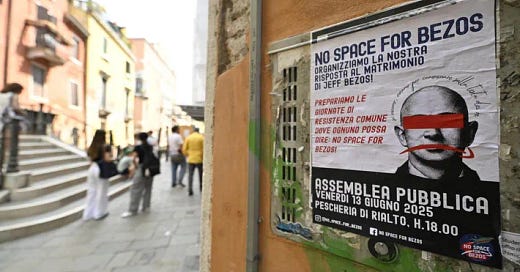Jeff Bezos used to be the poster child of frugality. Amazon was built in a garage. They used cardboard doors as desks. It was practical, not performative.
Of course, that was a long time ago.
After stepping down as CEO in 2021, Bezos didn’t exactly go inward. He left the wife who’d been by his side since the beginning.
He launched himself into space in a very large, very phallic rocket via Blue Origin.
He bought one of the most expensive superyachts in the world — a reportedly $500 million vessel named Koru — and started sailing the globe, even anchoring near climate conferences.
This is both ironic and revealing. According to estimates, Koru emits over 7,000 tons of CO₂ per year, despite Bezos’s climate philanthropy through the Earth Fund.
Now he’s renting out parts of Venice for his wedding. Literally. He booked out San Giorgio Maggiore island and luxury hotels across the city. Venetians are protesting with signs that say, “No space for Bezos.” And you get why.
Interestingly, the name of his yacht, Koru, comes from Māori culture.1 It symbolizes new life, renewal, and inner peace. A spiral based on the unfurling silver fern. It’s a beautiful symbol — and also a little heartbreaking when seen alongside the opulence it now floats on.
Jeff Bezos isn’t evil. He’s not stupid either. He’s brilliant and visionary in many ways. But brilliance doesn’t mean wholeness. And success doesn’t mean you’ve tended to the parts of you that are still hurting.
It’s obvious from a distance that there’s contradiction and ego at play. But why doesn’t Bezos see it? I’ve been thinking about this in terms of Internal Family Systems (IFS), which offers a lens into the hidden parts of us that steer behavior.
What we call “ego” might just be a protector — a part of us trying to manage pain, shield vulnerability, or prove worth. So when Bezos buys a superyacht, rents out Venice, or races Musk to space, it’s more than billionaire flair. It’s a part of him trying to stay one step ahead of deeper feelings he can’t touch.
And that’s where the contradiction shows up.
In Amazon’s early days, they worked their asses off — sleeping in offices, using doors as desks, obsessed with frugality and customer obsession. That external drive came from internal parts: perfectionists, inner critics, fear-based overachievers.
According to former SVPs and numerous accounts (like in Brad Stone’s The Everything Store and a 2013 Harvard Business Review article), Bezos’s internal critic was famously ruthless — firing off things like “Are you lazy or just incompetent?” or “I’m sorry, did I take my stupid pills today?” at colleagues. There are even employees recalling that “Amazon wants you to be an asshole” and that “nearly every person I worked with… cried at their desk.”
Those parts built Amazon — but when they’re still running the show decades later, long after survival depended on them, success feels hollow. So you keep chasing, expanding, performing, as if that will fill the emptiness.
Oh, and those are just the internal workings of Amazon, the emotional machinery behind the hustle. But what’s the result on the outside?
A tidal wave of cardboard boxes we don’t need. One-click shopping for things we’ll forget about tomorrow. Mountains of waste. Delivery vans clogging streets. Workers timed down to the second. And beneath it all, the quiet spread of a monoculture — one that worships growth, speed, and more as if they’re virtues.
We call it innovation, but it’s really just impulse gratification at scale.
That’s why this isn’t really about Bezos. It’s about the world we’ve created that glorifies productivity over presence, ambition over introspection, performance over peace. We celebrate the man who builds rockets, but we rarely ask what part of him needs to fly.
These wounded drives — protective inner parts formed to survive, to belong, to feel enough — aren’t bad. They’re scared. And left unchecked in a culture that idolizes hustle and control, they create spiritual inflation: more wealth, more power, more distraction… and still, something missing.
Contrast Bezos with Manoj Bhargava, the billionaire behind 5‑Hour Energy. He’s giving away 99% of his wealth — building water systems, mobile hospitals, renewable energy solutions. Not for PR, but as an offering.2
One billionaire builds rockets. The other builds wells.
It’s not about who’s right. It’s about who’s still running — and what they’re running from. Because when you don’t tend to your inner world, no amount of money, admiration, or control will ever feel like enough. You’ll keep building, keep chasing, keep sailing.
But what you’re really chasing can’t be owned.
We don’t need more men launching into space. We need more men who can sit with shame. Who can feel grief. Who can ask themselves, “What part of me is doing the chasing?”
The real launch isn’t upward. It’s inward.
And the real flex isn’t a superyacht. It’s knowing who you are without one.
In traditional Māori understanding, the koru would more likely symbolize quiet inner transformation, not outer excess.
Bhargava spent years in Indian ashrams before founding 5‑Hour Energy. His values were shaped less by boardrooms and more by monasteries. He’s committed to giving away 99% of his wealth. His projects focus on basic needs: clean water, electricity, healthcare.
I coach entrepreneurs and freelancers who’ve achieved a lot—but feel something is missing. If you’re ready for a new path, a new way of being, let’s talk. Learn more here.




